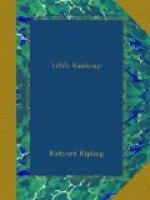Then followed another growl which the colonel tried to beat down. The mess was in no mood just then to weigh insults to Russian colonels.
’He does not remember, but I think that there was an accident, and so he was not exchanged among the prisoners, but he was sent to another place— how do you say?—the country. So, he says, he came here. He does not know how he came. Eh? He was at Chepany’—the man caught the word, nodded, and shivered—’at Zhigansk and Irkutsk. I cannot understand how he escaped. He says, too, that he was in the forests for many years, but how many years he has forgotten—that with many things. It was an accident; done because he did not apologise to that our colonel. Ah!’
Instead of echoing Dirkovitch’s sigh of regret, it is sad to record that the White Hussars livelily exhibited un-Christian delight and other emotions, hardly restrained by their sense of hospitality. Holmer flung the frayed and yellow regimental rolls on the table, and the men flung themselves at these.
‘Steady! Fifty-six—fifty-five—fifty-four,’ said Holmer. ’Here we are. “Lieutenant Austin Limmason. Missing.” That was before Sebastopol. What an infernal shame! Insulted one of their colonels, and was quietly shipped off. Thirty years of his life wiped out.’
‘But he never apologised. Said he’d see him damned first,’ chorused the mess.
’Poor chap! I suppose he never had the chance afterwards. How did he come here?’ said the colonel.
The dingy heap in the chair could give no answer.
‘Do you know who you are?’
It laughed weakly.
’Do you know that you are Limmason—Lieutenant Limmason of the White Hussars?’
Swiftly as a shot came the answer, in a slightly surprised tone, ’Yes, I’m Limmason, of course.’ The light died out in his eyes, and the man collapsed, watching every motion of Dirkovitch with terror. A flight from Siberia may fix a few elementary facts in the mind, but it does not seem to lead to continuity of thought. The man could not explain how, like a homing pigeon, he had found his way to his own old mess again. Of what he had suffered or seen he knew nothing. He cringed before Dirkovitch as instinctively as he had pressed the spring of the candlestick, sought the picture of the drum-horse, and answered to the toast of the Queen. The rest was a blank that the dreaded Russian tongue could only in part remove. His head bowed on his breast, and he giggled and cowered alternately.
The devil that lived in the brandy prompted Dirkovitch at this extremely inopportune moment to make a speech. He rose, swaying slightly, gripped the table-edge, while his eyes glowed like opals, and began:




